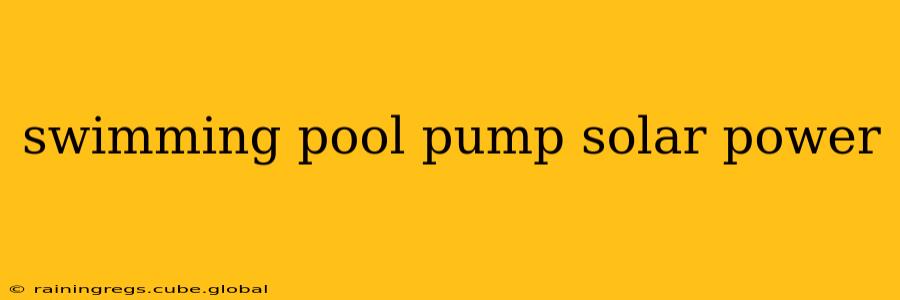Running a swimming pool pump can significantly impact your energy bills. However, harnessing the power of the sun through solar energy offers a sustainable and cost-effective solution. This comprehensive guide explores the advantages, considerations, and practical aspects of powering your swimming pool pump with solar power. We'll delve into the specifics, answering common questions and guiding you toward making an informed decision.
How Does a Solar-Powered Swimming Pool Pump Work?
A solar-powered pool pump utilizes photovoltaic (PV) panels to convert sunlight into electricity. This electricity then powers your pool pump, reducing or eliminating your reliance on the grid. The system typically involves solar panels, a charge controller (to regulate the flow of electricity), and an inverter (to convert DC power from the panels to AC power for the pump). Some systems even incorporate battery storage for nighttime operation or cloudy days. The size of the solar panel array depends on the pump's power requirements and your local sunlight conditions.
What are the Benefits of Using Solar Power for My Pool Pump?
Switching to a solar-powered pool pump offers numerous benefits:
- Reduced Energy Costs: This is arguably the most significant advantage. You'll drastically lower or even eliminate your electricity bills associated with pool pump operation.
- Environmental Friendliness: Solar power is a clean energy source, reducing your carbon footprint and contributing to a more sustainable lifestyle.
- Increased Property Value: A solar-powered pool is a desirable feature that can enhance your property's value.
- Government Incentives: Many governments offer rebates and tax credits to incentivize the adoption of solar energy, potentially reducing the upfront cost.
- Low Maintenance: Solar panels require minimal maintenance, typically involving occasional cleaning.
How Much Does a Solar Pool Pump System Cost?
The cost of a solar pool pump system varies depending on several factors:
- Size of your pool: Larger pools require more powerful pumps and, consequently, larger solar arrays.
- Pump size and energy consumption: A more energy-efficient pump will reduce the size of the solar array needed.
- Number of solar panels: More panels mean a higher initial investment but potentially greater energy savings over time.
- Installation costs: Professional installation is recommended and adds to the overall cost.
- Battery storage (optional): Adding battery storage increases the initial cost but provides greater flexibility and operation during periods of low sunlight.
Is a Solar Pool Pump Right for My Home?
Determining the suitability of a solar pool pump depends on several factors:
- Sunlight availability: You need sufficient sunlight exposure to effectively power the pump. A south-facing location is generally ideal in the Northern Hemisphere.
- Pool pump size and usage: Evaluate your pool pump's energy consumption to determine the appropriate size of the solar array.
- Budget: Consider the initial investment costs and long-term savings.
- Local regulations and incentives: Check for any applicable rebates or tax credits in your area.
What are the Different Types of Solar Pool Pump Systems?
There are several types of solar pool pump systems available, each with its own advantages and disadvantages. These include:
- Grid-tied systems: These systems connect to your existing electrical grid, utilizing solar power when available and supplementing with grid power when needed.
- Off-grid systems: These systems operate independently of the grid, relying solely on solar power and potentially battery storage. They offer greater independence but require more planning and investment.
- Hybrid systems: These systems combine aspects of both grid-tied and off-grid systems, offering flexibility and resilience.
Can I Install a Solar Pool Pump Myself?
While some simpler systems might allow for DIY installation, professional installation is generally recommended. Improper installation can lead to safety hazards and reduced efficiency. A qualified installer can ensure proper sizing, wiring, and integration with your existing system.
How Long Does a Solar Pool Pump System Last?
Solar panels have a long lifespan, typically lasting 25 years or more. The other components of the system, such as the pump, inverter, and charge controller, have shorter lifespans and may require replacement over time.
What is the ROI on a Solar Pool Pump?
The return on investment (ROI) for a solar pool pump varies considerably based on factors like electricity costs, sunlight availability, and the system's cost. However, with rising energy prices, many homeowners find the long-term savings outweigh the initial investment.
This comprehensive overview provides a solid foundation for understanding the advantages, complexities, and considerations involved in choosing a solar-powered swimming pool pump. Remember to consult with qualified solar professionals to determine the best system for your specific needs and circumstances.
